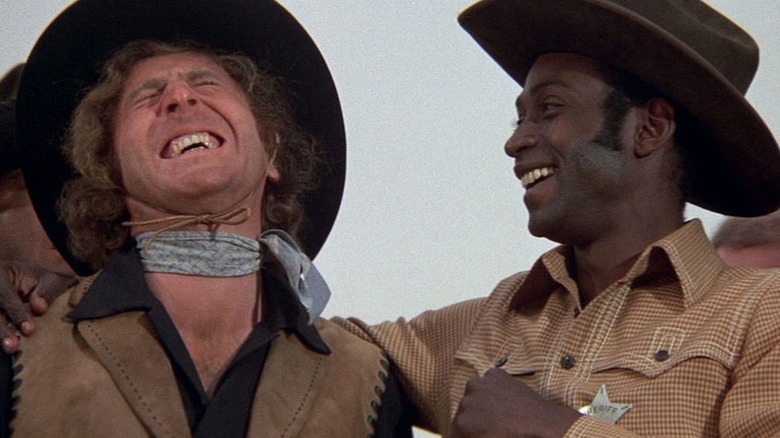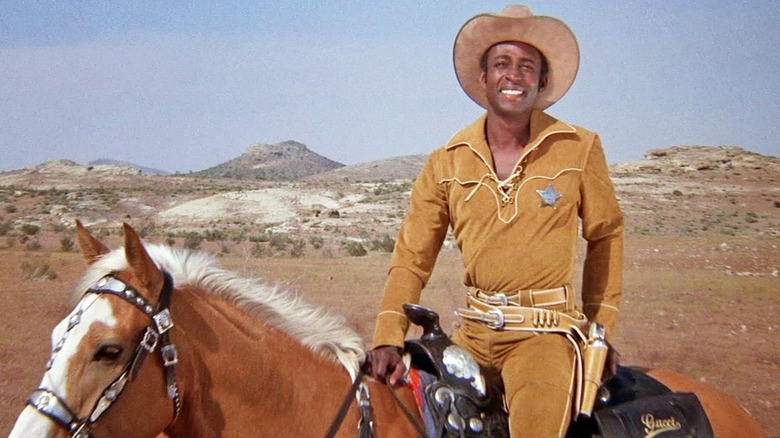Mel Brooks Thought The Classic Film Blazing Saddles Would Get Him Killed
You couldn't make "Blazing Saddles" today.
For one, it's already 12:30, and you haven't eaten lunch yet. Then you said you'd take that pile of old clothes to the Goodwill, and also swing by the pharmacy to pick up your dad's ear medicine. By then, it would already be about 2:30 or 3pm. There just wouldn't be enough time to make "Blazing Saddles."
When Mel Brooks made "Blazing Saddles" in 1974, however, he had plenty of time. He also had access to a brilliant script (which he co-wrote with Norman Steinberg, Andrew Bergman, Richard Pryor, and Alan Uger), a wonderful cast of comedic geniuses (including Cleavon Little, Gene Wilder, Harvey Korman, and Madeline Kahn), and a healthy willingness to rip apart every halcyon tradition associated with the American Western. "Blazing Saddles" spoofed Westerns to within an inch of their lives, examining the horrid racism that the genre tends to overlook or even romanticize.
"Blazing Saddles" is a comedy about racism but never makes light of it, putting all the racism into the mouths of either idiot cowboy villains or ignorant backwoods bumpkins. By the end of the film, at least, the bumpkins learn to accept Sheriff Bart (Little) as their community law enforcer, and to free marginalized railroad workers from their financial bondage by giving them a healthy plot of land.
In 2014, Brooks was interviewed by EW, and he recalled feeling incredibly nervous about "Blazing Saddles." He knew a comedy about racism may not be well-received, and he prepared himself for the worst. Notably, he was afraid of cheesing off bigoted audiences who wouldn't accept a Black hero, or calls for tolerance. Luckily for Brooks, there was no riot.
Mel Brooks 'envisioned a race riot' when Blazing Saddles came out
Since its release in 1974, "Blazing Saddles" has been repeatedly held up as one of the funniest films of all time. It had been inducted in the Library of Congress, and President Barack Obama waxed nostalgic about seeing it as a boy. It also feels frustratingly salient, addressing race relations with a light touch, but with the appropriate amount of subtle outrage. It was also nominated for three Academy Awards, for its theme song, its editing, and for Madeline Kahn's performance.
When asked if he could have predicted the overwhelmingly positive response to his film, Brooks couldn't have been more surprised. He said:
"I envisioned a race riot. I thought everybody would come after me and kill me for what I said about the Chinese, and the Blacks, and the Jews. I thought if this was shown in Waco, Texas, the whites would storm the screen and cut it to ribbons. Because we were kind of hoisting the Black sheriff up on our shoulders and made him a hero. But Texas liked it as much as New York."
Brooks admitted that the secret to writing as daring and funny a film as "Blazing Saddles" required something of a devil-may-care attitude. The EW interviewer noted that "Blazing Saddles" came to define Brooks as an artist, and wondered what might warrant that observation. Brooks only admitted that he did it without a commercial concern in his head, saying:
"I just wanted to exorcise both my angels and demons. I said to all the writers, 'Look, fellas, don't worry, this movie will never get released. Never. [Warner Bros.] will see it and they'll say, 'Let's bury it.' So let's go nuts. Let's write things that we never would dare write.' And we did."
Decades later, we're still glad they took that approach.

